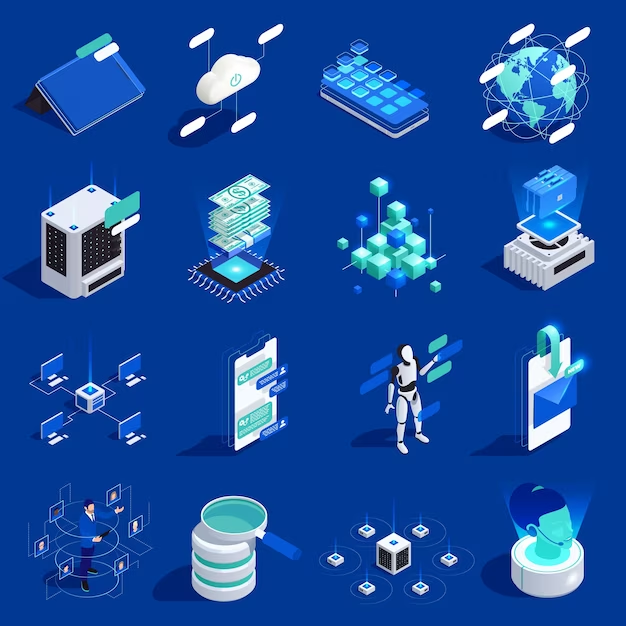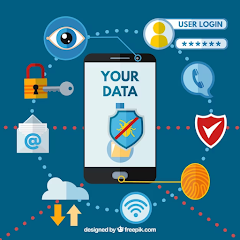Investigating Advancement in Internet of Things (IoT) Innovation: A Look Into the Future
The Internet of Things (IoT) has emerged as a disruptive force in technology, altering industries, improving our daily lives, and promising an unparalleled level of connectedness and ease in the future. IoT innovation is at the vanguard of the digital revolution, with almost infinite promise. This blog will delve into the enthralling realm of IoT innovation, its current condition, and the great opportunities it has for the future.
Understanding the Internet of Things
The Internet of Things (IoT) is a network of interconnected physical devices, vehicles, buildings, and other items that are integrated with sensors, software, and network connectivity. These "smart" devices collect and exchange data, resulting in an ecosystem of interconnected components that can work in unison. These devices' data can be examined to generate useful insights, automate processes, and improve decision-making.
 |
| Internet of Things |
The State of IoT Innovation Today
To fully grasp the scope of IoT innovation, it is necessary to look at its existing uses and impact on many industries.
Smart Homes
The Internet of Things (IoT) has drastically altered the way we live in our houses. Smart thermostats, lights, security cameras, and voice-activated assistants such as Alexa from Amazon or Google Assistant from Google have made houses more convenient, energy-efficient, and secure. These devices may be controlled remotely via smartphone apps, allowing for seamless integration into our daily life.
 |
| smart homes |
Healthcare
IoT innovation has greatly benefited the healthcare business. Smartwatches and fitness trackers, for example, monitor vital indicators, track physical activity and deliver real-time health data. IoT is especially important in telemedicine and remote patient monitoring, allowing clinicians to check patients' health and alter treatments remotely as needed.
Agriculture
Precision farming is transforming agriculture thanks to IoT. Farmers can improve irrigation, fertilizer, and pest management by using smart sensors and drones to collect data on soil conditions, weather, and crop health. As a result, food yields increase and farming practices become more sustainable.
Transportation
With the development of driverless vehicles and linked automobile systems, the automotive sector is adopting IoT. Vehicles can connect with one another and with infrastructure thanks to Internet of Things technology, which improves road safety and traffic management. In addition, IoT-enabled logistics systems improve supply chain efficiency and lower transportation costs.
Industrial Internet of Things (IIoT)
IoT is being used in the industrial sector to improve automation and predict maintenance. Sensors are used in factories and manufacturing facilities to monitor equipment performance, detect anomalies, and schedule maintenance, decreasing downtime and increasing productivity. The Internet of Things (IoT) is a crucial enabler of Industry 4.0, the fourth industrial revolution.
 |
| industry 4.0 |
Smart Cities
IoT is playing a critical role in the development of smart cities. IoT technologies are enhancing urban infrastructure and quality of life for city residents, from sophisticated traffic management and waste collection systems to connected streetlights and public Wi-Fi.
Key Technologies and Trends in IoT Innovation
To stay up with the fast pace of IoT innovation, it's critical to look at some of the important technologies and trends impacting the landscape.
5G Network Connectivity
The deployment of 5G networks will be a game changer for IoT. 5G enables IoT devices to transmit and receive data at unprecedented speeds by providing faster, more reliable, and lower-latency connections. This technology is critical for real-time data processing applications such as autonomous vehicles and remote surgery.
Computing at the The peripheral area (Edge Computing)
Edge computing is the processing of data closer to the source, which reduces latency and bandwidth requirements. This is especially important for IoT applications where quick decisions are required. Edge computing enables IoT devices to process data locally, reducing the load on central servers and improving response times.
Machine Learning and Artificial Intelligence (AI)
AI and machine learning are critical components of IoT development. They allow devices to analyze data, recognize patterns, and predict outcomes.For example, AI-powered image recognition in security cameras can detect potential threats, and machine learning algorithms in smart buildings can optimize energy consumption.
Blockchain
Blockchain technology is increasingly being integrated with IoT in order to improve security and trust. Blockchain ensures the integrity of IoT data by creating tamper-proof records of device interactions and transactions. This is especially important in industries such as supply chain management and healthcare.
Sustainability
Sustainability is becoming increasingly important, and IoT plays an important role in environmental monitoring and conservation efforts. Smart sensors and Internet of Things devices are used to track air quality, water usage, and energy consumption, assisting organizations and individuals in making more environmentally friendly decisions.
Natural Language Processing and Voice Processing
Voice assistants such as Amazon's Alexa and Google Assistant are increasingly being integrated into IoT ecosystems. They enable users to use voice commands to control smart devices and access information, making human-device interaction more intuitive.
 |
| Alexa voice processor |
Privacy and security of data
Concerns about data privacy and security are growing as IoT adoption grows. Encryption, authentication, and access control innovations are critical for protecting sensitive data transmitted by IoT devices.
IoT Innovation Future
The future of IoT innovation looks bright, with numerous exciting developments on the horizon.
Medical Innovations
IoT will continue to revolutionize healthcare in the coming years. Remote monitoring devices will become more sophisticated, allowing healthcare providers to diagnose and treat patients from a distance more effectively. Furthermore, IoT-driven data will benefit personalized medicine by allowing for tailored treatments and drug regimens.
Agriculture that is smart
Precision agriculture will become the norm as IoT integration increases in the agriculture industry. AI and machine learning algorithms will assist farmers in making data-driven decisions, increasing crop yields and decreasing environmental impact.
 |
| smart agriculture |
Everything is self-sufficient.
Drones, autonomous vehicles, and machines are expected to become more common. These systems will become safer, more efficient, and widely adopted as AI and 5G technology advances, transforming transportation, logistics, and other industries.
Cities that are Smart
As more cities strive to become "smart," we can expect an increase in IoT deployments. Better public transportation, optimized energy usage, and improved waste management will all contribute to more sustainable and livable urban environments.
 |
| smart cities |
IoT in Education
IoT in Education IoT innovation is expected to have a significant impact on education.Smart classrooms and remote learning technologies will advance, enabling immersive and interactive educational experiences.
Improved Retail Experiences
With innovations such as cashierless stores, personalized shopping experiences, and inventory management solutions that reduce waste and increase efficiency, IoT will continue to shape the retail industry.
Problems and Concerns
While the future of IoT innovation is exciting, there are some challenges and concerns to consider. Among the notable issues are:
Security Threats
IoT devices are becoming more interconnected and integrated into critical infrastructure, making them appealing targets for cyberattacks. It is critical to ensure the security of these devices and the data they collect.
Data Privacy
IoT devices frequently collect a large amount of data about individuals and their behaviors. The challenges of maintaining data privacy and obtaining informed consent for data collection are ongoing.
 |
| data privacy |
Interoperability
The IoT ecosystem is made up of numerous devices from various manufacturers, each with their own set of standards and protocols. It is still difficult to achieve seamless interoperability among these devices.
Sustainability
Concerns have been raised about the environmental impact of IoT devices due to their proliferation. Sustainable practices and energy-efficient designs must be prioritized by manufacturers and developers.
Final Wordings
The Internet of Things is changing how we live, work, and interact with our surroundings. IoT innovation has already made significant strides in a variety of industries, and the future holds even more exciting developments.As IoT technologies evolve and mature, they will provide solutions to some of society's most pressing problems, such as healthcare and transportation, as well as agriculture and environmental conservation.
 |
| future world of technology |
However, there are challenges to overcome, as with any transformative technology. To ensure a bright and responsible future for this revolutionary innovation, security, privacy, and sustainability must be prioritized in IoT development. We can look forward to a world that is more connected, efficient, and sustainable than ever before if we address these challenges and fully utilize the potential of IoT.

0 Comments